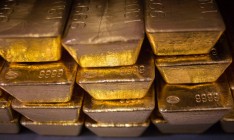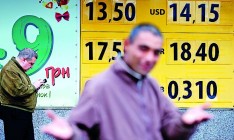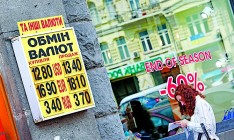Finance
Monetary policyThe NBU returns to the currency policy of Arbuzov’s tenure

Today the National Bank of Ukraine has announced its transition to tough monetary policy in order to hold back hryvnia devaluation. This primarily means that the discount rates for hryvnia will be raised. Starting from February 6 the NBU will increase its annual discount rate from 14% to 19.5%. “By the end of 2015 inflation will amount to 17.2%, according to our forecasts and the rate of 19.5% in real time will make our discount rate positive,” says Director of the NBU Monetary Policy and Economic Analysis Department Serhiy Nikolaichuk.
Hot line
The rates for instruments of liquidity regulation – refinancing loans and deposit certificates will depend on the level of the discount rate. This will ensure synchronization of all rates the NBU operates with and, in turn, will allow the banks to easier plan their liquidity, believes NBU Governor Valeriya Hontareva.
That is why following the increase of the discount rate the NBU will also raise the cost of refinancing for the banks. Starting from February 6 the rate for overnight loans will be increased from 17.5% to 23%. For longer-term loans it will be set at the level of the discount rate – 19.5%. Every day the financial regulator holds tenders of overnight refinancing and every Wednesday – tenders for longer-term loans. Once a month the NBU issues refinancing loans for the term of 90 days and three times for the term of two weeks.
The NBU will also increase the cost of instruments, which absorb the liquidity on the market, specifically deposit certificates. Starting from February 6 the overnight deposit certificates will be placed at 13%, which is 2.2 percentage points more than earlier. For longer-term deposit certificates the rate will be increased from 13% to 15%. The NBU holds tenders for deposit certificates on daily basis and attracts money for the term from one to 90 days.
Leading analyst of Expert Rating Vitaliy Shapran believes that the increase of the rates is a necessary measure. “The rates of inflation accelerated in November-December and the rate at the level of 14% was factually negative. This meant that hryvnia from the NBU cost for the banks not just cheaply, but that its cost was lower than the rates of the loss of purchasing power by the national currency,” he emphasized.
Risky diet
Starting from this year the NBU is pulling out the liquidity from the market. “For refinancing tenders we reduced the volumes of transactions from UAH 13.2 bn as of the end of last year to UAH 11 bn as of today. At the same time the volume of transactions on withdrawal of liquidity through deposit certificates increased from UAH 19.8 bn to UAH 22.3 bn,” tells Director of NBU Open Markets Department Oleh Churiy. “Thus, around UAH 5 bn has been pulled from the market.”
Overall the NBU absorbed UAH 24 bn of excess liquidity on the market, says Hontareva. “We’ve never had such figures in our history. The general corresponding account of the banking system is at the level of UAH 30 and UAH 24 bn absorbed through deposit certificates. That indicates that we have around UAH 54 bn in the system,” tells the NBU governor. Of this amount UAH 26 bn is required for maintaining mandatory reserves. Therefore there is around UAH 30 bn in the system today for crediting the economy. However, this money is not spent on provision of financing.
Last year the loans in hryvnia for individuals dropped by 12% and for companies – by 8%. In foreign currency, crediting dropped even more – 24% on individual loans and 22% - corporate loans, according to the NBU. When the banks do not lend money, while there is hryvnia available, as a rule it is used by the banks for currency speculations. Increase of the discount rate limits speculation opportunities and physical demand for the currency. “However, increase of the rates will result in even bigger removal of liquidity from the banking system and business. Meanwhile this will lead to decrease of proceeds to the national budget and new problems of the companies, downsizing and decrease of the people’s incomes,” emphasized managing partner at Capital Times Erik Naiman.
Developed countries usually use the increase of discount rates to cool down the overheated economy, which is growing too fast. Underdeveloped countries like Ukraine are trying to stop devaluation through raising discount rates, but only tighten the rope around the neck of the economy, believes Naiman.
The NBU conducted the policy of expensive money back in 2013. It was then actively criticized, including by Hontareva, because high discount rates do not provide opportunities for business lending to develop. Now the NBU governor said that expensive money would almost not affect lending. “How can we speak about limitation of lending, when even with negative discount rates last year the lending decreased,” agreed Nikolaichuk.
Officials believe that the banks are folding crediting not because of the cost of the resources, but rather because of the risks they do not want to undertake, because creditors in Ukraine are very poorly protected from abuse on the part of large borrowers. Hontareva believes that economic growth is possible only in cse of financial stabilization.
To raise the standard
It is possible to achieve financial stability only by stopping devaluation, which last year was the main reason that caused high inflation. In December 2014 consumer inflation reached 24.9% in annual terms. Basic inflation increased to 22.8%, having accelerated in the last three months of the year. “Our analysis of the risks of increase of discount rates showed that they are relatively low compared with the risks of further devaluation,” says Nikolaichuk.
Increase of the discount rates along with the new expanded IMF assistance program will help slow down inflation rates already in the first half of 2015, believes NBU. The NBU forecasts that at the end of 2015 consumer inflation will amount to 17.2% and in 2016 – less than 10%.
Increase of the discount rate will allow to divert part of “speculative” money from the currency interbank exchange, says Shapran. Nonetheless devaluation risks remain very high.
Starting from today the NBU cancelled the indicative rate (the banks could not sell currency at the rate higher than the indicative rate) and stopped holding daily currency auctions. Today the banks did not have the upper limit for their quotations. “Cancellation of indicative rate means that we are returning to the currency interbank and weighted average rate of the interbank as the basis for establishment of the official NBU rate,” explains Shapran.
Bankers hope that abolition of indicative rate should reduce the volumes of the black currency market and return currency exchange transactions into the legal plane, specifically bank offices. Today, as financiers expected, the currency increased in price. Internbank exchange rate grew over the day from UAH 16.5/USD to UAH 21.66/USD. On the black market dollar in sale increased by UAH 0.40 to UAH 22.11-23.24/USD. The NBU also raised the official hryvnia rate. At 2:00 pm it weakened the national currency by UAH 1.27 to UAH 17.99/UAH.







 of the agreement of syndication with Financial Times Limited are strictly prohibited. Use of materials which refers to France-Presse, Reuters, Interfax-Ukraine, Ukrainian News, UNIAN agencies is strictly prohibited. Materials marked
of the agreement of syndication with Financial Times Limited are strictly prohibited. Use of materials which refers to France-Presse, Reuters, Interfax-Ukraine, Ukrainian News, UNIAN agencies is strictly prohibited. Materials marked  are published as advertisements.
are published as advertisements.